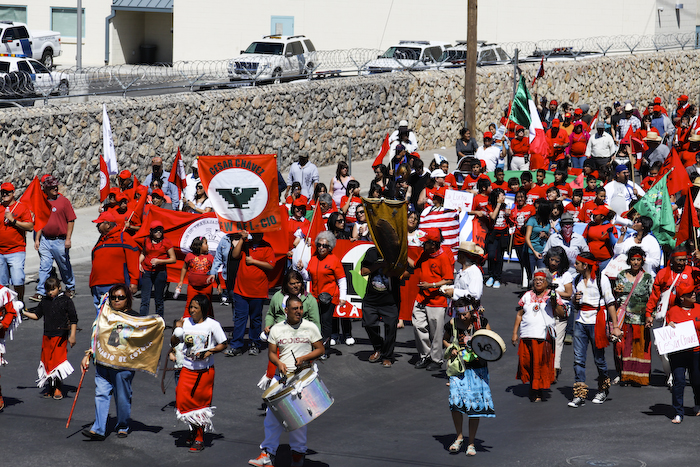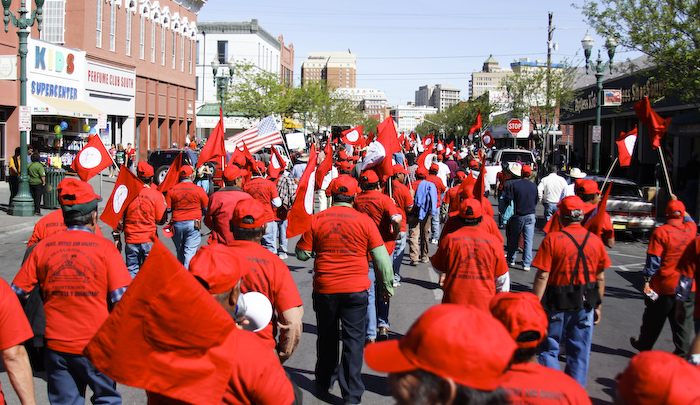EL PASO — César Chávez was buried — to his wishes — in a plain pine coffin built by his brother, Richard. This was a simple, even selfless request from one of the most influential and celebrated figures in American history.
It spoke to Chávez’s humility in his struggle for workers’ rights: to be remembered as a fellow soldier and not as a decorated leader or a messiah.
The death of the figurehead meant a new life for the cause, La Causa became Nuestra Causa.
The man would have celebrated 84 years of life this year. Instead, 18 years after his passing, farm workers and students alike are celebrating 18 years since the birth of Nuestra Causa.
In January of this year, community leaders and students at the University of Texas at El Paso protested the Faculty Senate’s decision to remove César Chávez Day as an official school holiday. “We were very quick as a university to drop the holiday without consulting the students, without consulting the culture, without consulting the community,” said Star Chacon, Junior, member of the UTEP Forensics Team. “I was very upset.”

Farm workers, students, educators, artists and lawyers flooded downtown El Paso. (Raymundo Aguirre/Borderzine.com)
This movement — running parallel to the people’s revolt in Egypt against President Hosni Mubarak — featured a petition drive and a march to UTEP President Diana Natalicio’s office led by Gold Nugget Award recipient, and community leader, Pete Duarte. Duarte surrendered his award in protest — akin to Chávez’s view on protest: non-violent, but powerful.
On February 8, the administration gave in and reinstated the holiday. The ensuing press release stated, “The Faculty Senate made this decision based on a clearer understanding of the new state requirements for staff holidays.” It’s interesting to note that the difference between revolution and complacency was “clearer understanding.”
Coincidentally, three days later, Mubarak resigned as the president of Egypt. Clarity of understanding between parties was not determined at the time of print.
An even greater coincidence to the drama surrounding César Chávez Day was all the commotion in the state of Wisconsin. While students at UTEP were celebrating victory, Wisconsin’s Governor, Scott Walker (R), along with fellow GOP members, sought to pass legislation that would greatly compromise unionizing and collective bargaining rights for public employees. The plight of laborers was reignited on the national stage once more as thousands took to the State Capitol in Madison.
Schools closed for weeks as teachers went on strike. Police removed hundreds of protesters who crowded into the capitol building, obstructing employees’ work.
Even the president of the AFL-CIO (an organization formerly in association with Chávez’s United Farm Workers), Richard Trumka, spoke in solidarity to the workers of Wisconsin. “The labor movement isn’t a fad or even an institution of brick and stone,” said Trumka.
“These structures around us are transitory, but the labor movement is not. It’s as resilient as democracy itself. The labor movement is working people — working people who have joined together for strength in numbers, for their common good. And history teaches us that whatever the odds, the labor movement will always spring up, often when its chances of survival seem most bleak.”
His words held prescience. On March 31, César Chávez Day, a Wisconsin judge ruled to temporarily halt the implementation of the law that would strip public employees of collective bargaining rights, the Madison State Journal reported. Meanwhile, throughout the country, a veritable Las Mañanitas was being sung in honor of the birthday boy.
President Obama issued a presidential proclamation acknowledging César Chávez Day nationally. He called on Americans “to observe this day with appropriate service, community, and educational programs to honor César Chávez’s enduring legacy.”
Chávez’s old friend, recently re-elected California Governor Jerry Brown, made it a point to issue his own proclamation declaring it “César Chávez Day” in the State of California. Jerry Brown was previously governor from 1975-83 and fought alongside Chávez. Festivals, parades and marches were held throughout the state.
The city of El Paso had a march of its own. The “Marcha Honoring César Chávez” was spearheaded by the Centro de los Trabajadores Agrícolas Fronterizos and collectively organized by the same groups that helped reinstate of the holiday. This was their victory lap.

Hundreds of El Pasoans march to remember César Chávez. (Raymundo Aguirre/Borderzine.com)
Farm workers, students, educators, artists and lawyers flooded downtown El Paso. Director of Centro de los Trabajadores Agrícolas Fronterizos, Carlos Marentes, characterized the march as a “social action.”
“That’s actually what we would like to organize and encourage: more social action,” Marentes said. “Social action that would bring people together, to bring the different issues and problems together so we can advance to solve them.”
“Traditionally, we’ve observed César Chávez’s life with a month long of activities every single year,” said Dr. Dennis Bixler-Marquez, Director of Chicano Studies at UTEP. “It hasn’t changed. This particular day is one of several events that UTEP is involved with on and off campus that somehow was left out of the media coverage during the protest that centered solely on the holiday.”
Bixler-Marquez was referring to an event held by the UTEP Forensics Team the day prior, “Celebrating César Chávez: His Message and Impact.” The team performed works written and inspired by Chávez including monologues and skits.
“He had a great deal to say about organized labor and also the humanist dimension of farm work in the United States,” said Bixler-Marquez. “He spoke about our need to appreciate how that food comes to be on our tables: the human cost. His issues went beyond union politics.”
An annual festival took place in El Paso’s historic Segundo Barrio. UTEP’s branch of the League of United Latin American Countries (LULAC) visited elementary schools to tell kids of Chávez’s legacy. Various art exhibits and lectures were held around the city. There was even a car show held in honor of Chávez.
UTEP’s Mexican American Student Society (M.A.S.S.) and the Movimiento Estudiantil Chicana/o de Aztlan (M.E.Ch.A.) arranged a pre-viewing of César’s Last Fast: an unfinished documentary about Chávez’ fast towards the end of his life. Director, Richard Ray Perez, uses footage from the Chávez family archives to show the up-close toll Chávez’ 1988 fast took on him as well as tell the story of his life work in leading the United Farm Workers. The film also examines the struggles of the present-day farm worker and the organizers who are following in Chávez’ footsteps.
The tumultuous first quarter of 2011 was, among other things, a populace party (lest we forget the uprisings in Libya and Tunisia). From the Southwest to the Midwest to the Middle East, the “us” fought against the “them” armed with signs, chants, cameras, guns and Facebook. And with the exception of the guns, César was in the details.
Probably the greatest gift anyone could give Chávez is honoring his legacy by taking up the cause of the people and fighting with the same meaningful, non-violent action that he dedicated his life to practicing. He lived for the cause, sacrificing even basic health in a fast that contributed to his death.
César Chávez Day has never really been about him. The slogan is “Sí, se puede,” not “Él si puede.” It is supposed to be celebration of justice and action the way St. Valentine’s Day is supposed to be a celebration of love (emphasis on “supposed to be”). The celebration of César Chávez Day, then, isn’t so much about preservation as it is perpetuation.
“Many people go and vote and then go home and wait for the change to happen,” said Marentes. “I think it’s time to do what César Chávez did: he went with the people at the bottom to seek changes. It requires becoming active, making sacrifices. That’s the only way we can make deep changes and we can change the reality.”
As Obama borrowed “sí, se puede” from La Causa, Marentes nodded to Obama’s famed “change happens from the bottom up” bit:
“You cannot build something from the top down. From the top down, you can only dig holes. And the deeper the hole, the faster the fall.”
– 30 –

